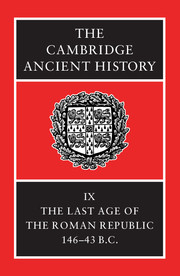6 - Sulla
Published online by Cambridge University Press: 28 March 2008
Summary
I. SULLA, SULPICIUS AND MARIUS, 88 B.C.
As the year 89 drew to its close, the predominant feeling at Rome may well have been one of relief. The fall of Asculum meant that the Social War was to all intents and purposes won, though isolated pockets of resistance lingered. Yet even the most cursory essay in divination should have revealed grave causes for concern about the future. The war had been bitterly contested, and resentment was bound to simmer. Rome’s concessions had been churlish and grudging. It seems that not all the Italians had yet been enfranchised, and the confinement of those who had within a minority of tribes made it clear that the Romans were determined to limit to the best of their ability the value of the prize that their allies had wrested from them. Thus the Italian question had by no means been settled: the struggle for even the most nominal equality still had much of its course to run, though the Italians could take comfort from the knowledge that there were still men at Rome who, for whatever motive, were prepared to champion their interests.
Nor did the manner in which the outbreak of war had been exploited in pursuit of private enmities give any grounds for hope that in internal affairs a spirit of conciliation would now prevail. The murder of Livius Drusus had gone unpunished, and the contentious operations of the quaestio Variana had inflicted wounds that were still unhealed. The war had enforced a temporary lull in political infighting, but now that it was over revival of the feuds of 90 could only exacerbate an already delicate situation and diminish further the always remote likelihood of a unified and statesmanlike approach to the problems of Italy. It could be safely predicted that the times would continue interesting and that the new citizens would have a large part to play.
The consulship of 88, to which Sulla was elected in the last weeks of 89, together with his friend Q. Pompeius Rufus, might have seemed no more than the just, if not inevitable, reward for his military achievements during the foregoing year. Yet it seems that he encountered competition from an unusual source: C. Iulius Caesar Strabo, aedile in 90, who had not held the praetorship, but nevertheless wanted to stand for the consulship.
- Type
- Chapter
- Information
- The Cambridge Ancient History , pp. 165 - 207Publisher: Cambridge University PressPrint publication year: 1994

